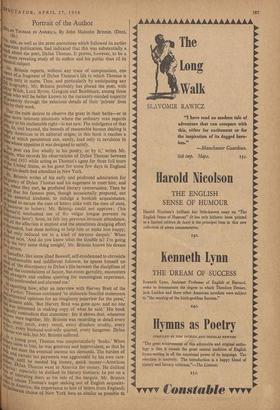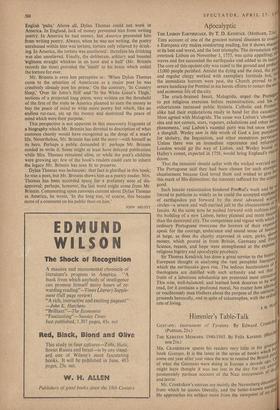Portrait of the Author
bYLAN THOMAS IN AMERICA. By John Malcolm Brinnin. (Dent, 18s,) Alts title, as well as the press quotations which followed its earlier American publication, had indicated that this was substantially a far about the poet, Dylan Thomas. It proves, however, to be a '.4t more revealing study of its author and his public than of its "Initial subject. Mr. Brinnin reports, without any trace of compunction, one aspect of At fragment of Dylan Thomas's life in which Thomas is ;Poet only in name. Thus, and particularly by anticipating any '41 biography, Mr. Brinnin. probably has placed the poet, with artists Wilde, Lord Byron, Gauguin and Baudclaire, among those r,t'sts who will be better known to the curiously-minded majority of Posterity through the salacious details of their 'private' lives "tan by their work. thl'hat the mob desires to observe the great in their baths—or in or9se more intimate situations where the ordinary man regards willaeY as his inalienable right—is not new. The indulgence of that kr, to and beyond, the bounds of reasonable human dealing is point American in its editorial origin; in this book it reaches a those at which persistence can, surely, lead only to revulsion in 13k whose appetites it was designed to satisfy. hi:j\lo poet can live wholly in his poetry, or by it,' writes Mr. 191Plin, who records his observations of Dylan Thomas between of 0 and 1953 while acting as Thomas's agent for three full tours avihe United States, as his guest for some few days in England 'as his death-bed attendant in New York. thl:Irr Brinnin writes of his early and profound admiration for ho°etrY of Dylan Thomas and his eagerness to meet him; and toll"' when they met, he proffered literary conversation. Then he of icl that his famous poet, though occasionally prepared, out prouis essential kindness, to indulge a bookish acquaintance, by Posed to escape the men of letters alike with the men of state, [Threenurse to lechery. Mr. Brinnip could not approve: ('his plizo.mas,$) unabashed use of the vulgar tongue prevents its wit°21cation here'). Soon, he felt 'my previous intimate attendance, it ci" all the affection it implied and the sometimes dredging effort I Isttoanded, had done nothing to help him or make him happy; 1;041 only reduced me to a kind of nervous despair.' When to logy says, 'And do you know what the trouble is? I'm going ler ° the very same thing tonight,' Mr. Brinnin knows his dream 4 dream, Til an ,.er, eafter, like some jilted Boswell, self-condemned to chronicle let,'!rireformable and indifferent Johnson, he spares himself no krt4'1 of 'the discrepancy in Dylan's life between the disciplines of kith the consolations of liquor, bar-room garrulity, encounters tyvhq, strallgers and endless questing for meaningless experience, l'el confounded and alarmed me.' lveitiv reporting how, after an interview with Harvey Breit of the an(' r°''ker, Thomas continued 'to elaborate fanciful statements 14r. \yhimsical opinions for an imaginary interview for the press,' else thinnin adds, 'But Harvey Breit was gone now, and no one Alta iwas interested in making copy of what he said.' His book Ilk t`:_alY contradicts that statement: for it shows that, whenever iltio;v° Were together, Mr. Brinnin was recording in detail every Ikber evcrY retch, every vomit, every drunken crudity, every Thor Y, every husband-and-wife quarrel, every hangover. Dylan A 'as was sick, but Mr. Brinnin suffered. atonea Young poet, Thomas was unspectacularly 'broke.' When totticiYearne to him, he was generous and improvident, so that he baqc ,not meet the eventual income tax demands. The burden of les4i dnd current tax payments was aggravated by his own care- tliolieeyss,until he needed big money, quick money—American ,itt)eirie., . Dylan Thomas went to America for money. He disliked ' '4et 0,4. especially he disliked its literary ]ionisers; he put on a hinIseit,. tolerating them as his side of the bargain. Mr. Brinnin antis .` 'elates Thomas's eager seeking out of English acquaint- 144ci'_!rt, America. the importance to him of letters from England; 'liberate choice of New York bars as similar as possible to English 'pubs.' Above all, Dylan Thomas could not work in America. In England, lack of money prevented him from writing poetry. In America he had money, but America prevented him from writing poetry. Always, when he was not writing, the poetry unreleased within him was torture, torture only relieved by drink- ing. In America, the torture was unrelieved: therefore his drinking was also unrelieved. Finally, the deliberate, solitary and boasted `eighteen straight whiskies in an hour and a half' (Mr. Brinnin records the time) provided the Ihsulf to his brain which ended the torture for ever.
Mr. Brinnin is even less perceptive in : 'When Dylan Thomas came to the attention of Americans as a major poet he was creatively already past his prime.' On the contrary, 'In Country Sleep,' `Over Sir John's Hill' and `In the White Giant's Thigh,' sections of a projected long poem, were written on the threshold of the first of the visits to America planned to earn the money to buy the peace of mind to write more poetry but which, like an endless rat-race, ate up the money and destroyed the peace of mind which were their purpose.
This perspective is not apparent in this unsavoury fragment of a biography which Mr. Brinnin has devoted to description of what common charity would have .recognised as the dregs of a man's life. Nevertheless, Mr. Brinnin has told the story—with himself as its hero. Perhaps a public demanded it: perhaps Mr. Brinnin needed to write it. Some might at least have delayed publication while Mrs. Thomas remained alive, or while the poet's children were growing up; few of the book's readers could care to inherit the legacy Mr. Brinnin has seen fit to preserve.
Dylan Thomas was lecherous: that fact is glorified in this book; he was a poet, but Mr. Brinnin shows him as a poetry reader. Mrs. Thomas has been accorded space for a prefatory note of dis- approval; perhaps, however, the last word might come from Mr. Brinnin. Commenting upon rumours current about Dylan Thomas in America, he wrote, 'In the long run, of course, this became more of a comment on his public than on him.'
JOHN ARLOTT











































 Previous page
Previous page